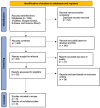Evaluation of and Current Trends in the Management of Gastrointestinal Stromal Tumors: A Systematic Review
- PMID: 35847170
- PMCID: PMC9281617
- DOI: 10.7759/cureus.26848
Evaluation of and Current Trends in the Management of Gastrointestinal Stromal Tumors: A Systematic Review
Abstract
Gastrointestinal stromal tumors (GISTs) are soft-tissue sarcomas that can occur anywhere in the digestive tract, with the stomach and small intestine being the most common locations. Because no imaging modalities diagnose GIST unequivocally, histological and immunohistochemical confirmation is usually required. Most GISTs are discovered by chance; hence, determining this condition's actual frequency can be challenging. Since diagnosing the tumor could be difficult, including GIST in the differential diagnosis is crucial. The objective of this review is to explore the multiple treatment options for this tumor and provide clinicians with more information on the evolving treatment modalities, which in the future could be a possible solution to cure GIST ultimately. After exploring several studies, the authors conclude that early detection is critical since the treatment depends on the tumor size, mitotic rate, and location. Medical management using targeted therapy approved by the United States Food and Drug Administration (FDA) include tyrosine kinase inhibitors such as imatinib, sunitinib, and regorafenib. Surgical resection of the tumor is also done in cases with localized tumors. Standard chemotherapy and radiotherapy are not commonly used to treat GIST patients. However, radiotherapy may be used as a palliative therapy to ease pain (such as bone pain) or control bleeding. Additional research is needed to establish potential therapeutic targets that will result in higher and longer-term response rates.
Keywords: current research; drug therapy; evaluation; gastrointestinal stromal tumors; treatment.
Copyright © 2022, Arzoun et al.
Conflict of interest statement
The authors have declared that no competing interests exist.
Figures
Similar articles
-
Ripretinib for the treatment of advanced gastrointestinal stromal tumor.Therap Adv Gastroenterol. 2021 Apr 15;14:17562848211008177. doi: 10.1177/17562848211008177. eCollection 2021. Therap Adv Gastroenterol. 2021. PMID: 33948116 Free PMC article. Review.
-
Imatinib mesylate: in the treatment of gastrointestinal stromal tumours.Drugs. 2003;63(5):513-22; discussion 523-4. doi: 10.2165/00003495-200363050-00005. Drugs. 2003. PMID: 12600228 Review.
-
Fourth-line rescue treatment ripretinib of advanced small intestine gastrointestinal stromal tumors who achieved partial response: a case report.J Gastrointest Oncol. 2022 Jun;13(3):1505-1513. doi: 10.21037/jgo-22-534. J Gastrointest Oncol. 2022. PMID: 35837161 Free PMC article.
-
Recent advances in the management of gastrointestinal stromal tumor.World J Clin Cases. 2020 Aug 6;8(15):3142-3155. doi: 10.12998/wjcc.v8.i15.3142. World J Clin Cases. 2020. PMID: 32874969 Free PMC article. Review.
-
[Gastrointestinal stromal tumors (GIST) of the stomach as a cause of upper gastrointestinal bleeding].Acta Chir Iugosl. 2007;54(1):115-8. doi: 10.2298/aci0701115e. Acta Chir Iugosl. 2007. PMID: 17633870 Serbian.
Cited by
-
Effect of Narrative Nursing Intervention on Patients with Specific Digestive Tract Malignancies (Esophageal, Gastric, and Intestinal Cancers): A Retrospective Study.Int J Gen Med. 2024 Dec 3;17:5747-5756. doi: 10.2147/IJGM.S489001. eCollection 2024. Int J Gen Med. 2024. PMID: 39650786 Free PMC article.
-
Trends and outcomes for patients receiving neoadjuvant therapy for stage I to III gastric gastrointestinal stromal tumors.J Gastrointest Surg. 2025 Aug;29(8):102117. doi: 10.1016/j.gassur.2025.102117. Epub 2025 Jun 16. J Gastrointest Surg. 2025. PMID: 40516690
References
-
- Clinical presentation, diagnosis, and prognosis of gastrointestinal stromal tumors. [ Mar; 2022 ];https://www.uptodate.com/contents/clinical-presentation-diagnosis-and-pr... 2021
Publication types
LinkOut - more resources
Full Text Sources

